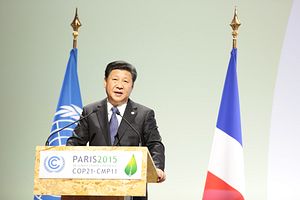Time for your China links:
First, a round-up of links on the climate change talks: Negotiators on a new climate change deal extended the deadline for ongoing talks in Paris, after a final push on Friday wasn’t able to seal the deal. While there’s optimism that a landmark new agreement will be unveiled on Saturday, countries are already positioning themselves to play the “blame game” after the summit closes. And China, which bore the brunt of criticism in the wake of the failed Copenhagen summit in 2009, is already having to fend off similar accusations of obstructionism.
Pilita Clark of Financial Times wrote this week that China was being accused of “blocking progress” at the Paris talks. Citing negotiators from a developed country, Clark writes that Chinese officials were watering down or blocking two measures: one to create a unified system for countries to report their carbon emissions and another to require countries to update their pledges every five years.
“[O]ne delegate told the FT that behind closed doors, India has been ‘quite helpful’ on some measures while China’s negotiators have been siding with other developing countries on several divisive issues,” Clark writes.
Leadership in Beijing was dismayed by the widespread perception that China scuttled the 2009 talks, believing it had fallen victim to a savvy PR ploy by the United States. China’s proactive attitude toward climate change this time around was in part calculated to avoid a repeat of 2009. In the wake of the Financial Times story, China began its own PR push to counter the accusations that it is hindering climate talks. Xinhua ran a piece framing China as a “staunch supporter, active contributor and constructive player in the global climate campaign.”
China’s Foreign Ministry also responded to the reports that China had not joined the self-named “high-ambition coalition” at the talks. Spokesperson Hua Chunying told reporters, “In fact, we are all ambitious partners in the endeavor to seal a deal and set up an influential international mechanism against climate change at the Paris conference. There is no such thing of anyone being shut out.”
In other news, the South China Morning Post has more details on China’s planned military reforms. Minnie Chan writes that the restructuring will eliminate the seven existing military regions in favor of five integrated combat zones, and scrap the existing “four headquarters” (the General Staff, General Political, General Logistics, and General Armaments departments) in favor of a unified command structure under the Central Military Commission. Most surprisingly, SCMP says the reforms are supposed to take place quite soon – by the beginning on 2016.
Foreign Policy has a fascinating look at how studying in America affects the mindset of Chinese students. It’s based on a tiny sample size, and was conducted online (which brings its own caveats), but the results are interesting: 60 percent said they had a more positive view of the United States, but 55 percent also reported more positive views of China. In a follow-up piece, Foreign Policy explains further: most of the students surveyed approve of Western values, but simultaneously don’t think they are a good fit for China – and support government efforts to suppress concepts like democracy and personal freedom. Some of the responses sound like direct quotes from Chinese officials: “Western thought certainly has areas worth learning from, but because national conditions are different, such thought is not suitable for use in China.”
Finally, in an interview with the BBC, the president of Namibia strongly denied reports that China had reached out to his country about establishing a military base. “I do not know anything about such a proposal. It never came to me,” President Hage Geingob said. He also essentially told the reporter it was none of the West’s business: “Do not bring in China into your ideological problems between China and your beliefs. If the Chinese come to us with a proposal, like everyone else does…That is for Namibians to decide, but I can assure you that there will be no secret deals. It is my country… and it does not affect you.”
































